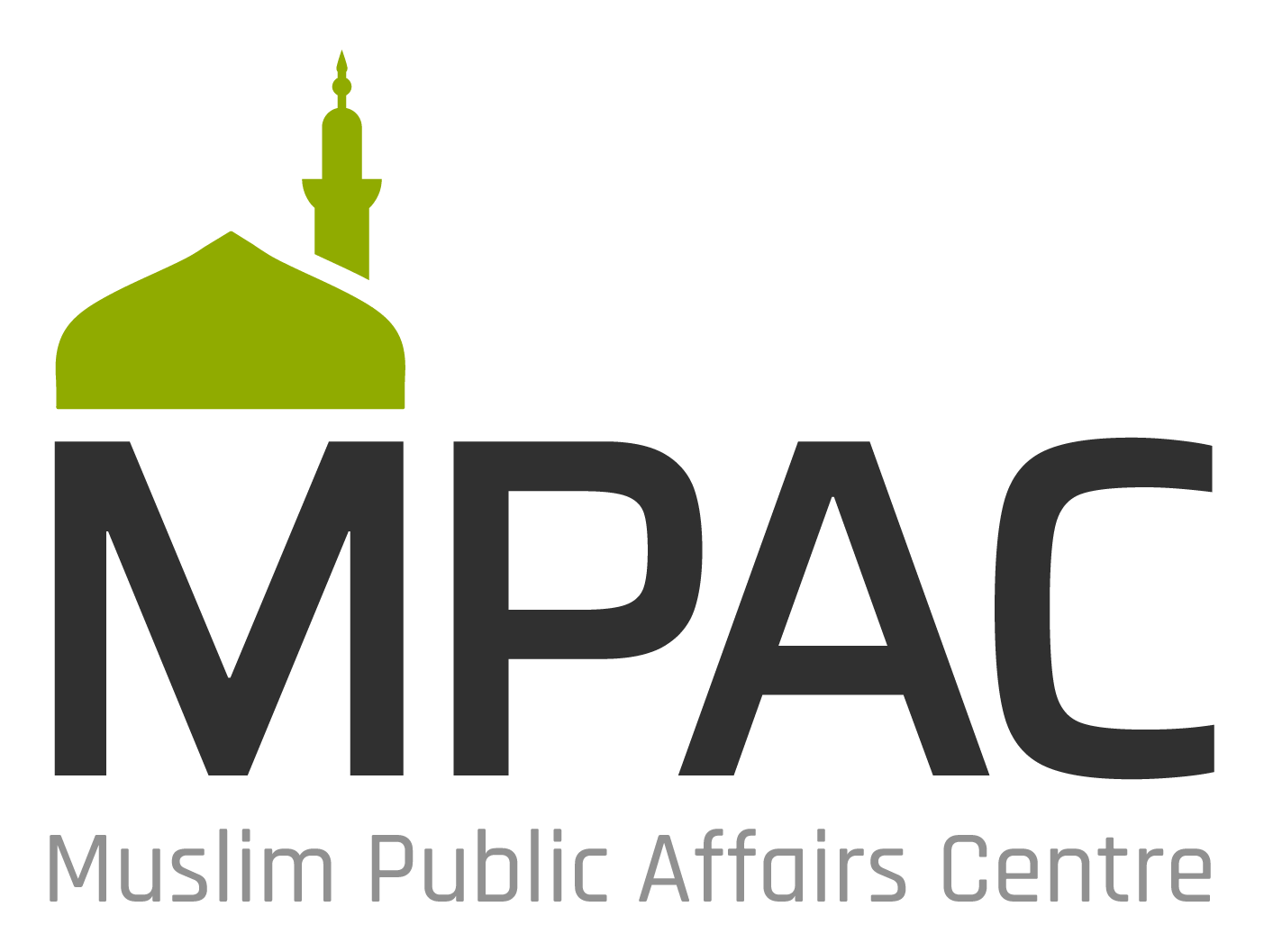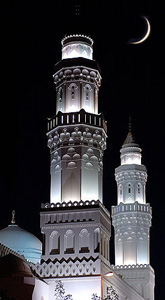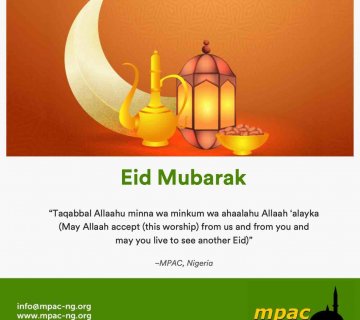|
|
| Masjid Qiblatai |
Alhamdulilahi, the blessed month of Ramadan is here again. We are thankful to Allah for granting us the life and Eeman to witness this month and MPAC congratulates all Muslims for seeing a month which Prophet Muhammad (peace and blessings be upon him) described as the most blessed month of the year. It’s the best season for offering good deeds and gaining rewards. It’s the month of reciting the Qur’an, fasting, saying dhikr (remembrance of Allah), performing i`tikaf (spiritual retreat in the mosque), and visiting Muslims. We pray that Allah make this month for us all a month that is filled with piety, forgiveness and blessings, amin.
Fasting is called sawm in the Qur’an. The word sawm literally means “to abstain”. In Surat Maryam, Allah tells that Mary the mother of Jesus said (“I have vowed a fast (sawm) for the sake of the Merciful, so today I shall not speak to anyone.”) (Maryam 19:26) The meaning is “I have vowed to abstain from speaking to anyone today.” According to Shari ‘ah, the word sawm means to abstain from all those things that are forbidden during fasting from the break of dawn to the sunset, and to do this with the intention of fasting.
According to Imam Al-Ghazali (d. 1111 C.E.), fasting produces a semblance of divine quality of samadiyyah (freedom from want) in a human being. Imam Ibn Al-Qayyim (d. 1350 C.E.), viewed fasting as a means of releasing the human spirit from the clutches of desire, thus allowing moderation to prevail in the carnal self. Imam Shah Waliullah Dahlawi (d. 1762 C.E.) viewed fasting as a means of weakening the bestial and reinforcing the angelic elements in human beings. Maulana Mawdudi (d. 1979 C.E.) emphasized that fasting for a full month every year trains a person individually, and the Muslim community as a whole, in piety and self restraint.
The Qur’an states what it means:
O you who believe! Observing al-sawm (the fasting) is prescribed for you as it was prescribed for those before you, that you may become al-muttaqoon (the pious). Qur’an al-Baqarah, 2:183.

Fasting According to the Sunnah
1. Take Zuhoor (pre-dawn meal). It is Sunnah and there is a great reward and blessing in taking sahur. The best time for zuhoor is the last half hour before dawn or the time for Fajr prayer.
2. Take iftar (break-fast) immediately after sunset. Shari‘ah considers sunset when the disk of the sun goes below the horizon and disappears completely.
3. During the fast, abstain from all false talks and deeds. Do not quarrel, have disputes, indulge in arguments, use bad words, or do anything that is forbidden. You should try to discipline yourself morally and ethically, besides gaining physical training and discipline. You should also not make a show of your fasting by talking too much about it, or by showing dry lips and a hungry stomach, or by showing a bad temper. The fasting person must be a pleasant person with good spirits and good cheer.
4. During the fast, do acts of charity and goodness to others and increase your worship and reading of the Qur’an. Every Muslim should try to read the whole Qur’an at least once during the month of Ramadan.
What is Prohibited During Fasting?
Things that invalidate the fast and require qadaa’ (making up for these days) are the following:
1. Eating, drinking or smoking deliberately, including taking any non-nourishing items by mouth, nose or anus.
2. Deliberately causing yourself to vomit.
3. The beginning of menstrual or post-childbirth bleeding even in the last moment before sunset.
4. Sexual intercourse or other sexual contact (or masturbation) that results in ejaculation (in men) or vaginal secretions (orgasm) in women.
Sexual intercourse during fasting is forbidden and is a great sin. Those who engage in it must make both qadaa’ (make up the fasts) and kaffarah (expiation by fasting for 60 days after Ramadan or by feeding 60 poor people for each day of fast broken in this way). According to Imam Abu Hanifah, eating and/or drinking deliberately during fast also entail the same qadaa’ and kaffarah.
During Ramadan, Muslims are also expected to refrain from indulging in violence, anger, envy, greed, lust and backbiting, and are meant to get along with each other better than normal. These values are expected to continue even after the fasting.
There are a number of groups of people who do not need to observe Ramadan, though they may if they wish:
- Children before the onset of puberty
- Soldiers on the battlefield
- Travelers
- Weak, elderly, and sick people
- Pregnant women, if they feel it might endanger their child
- Women who are breastfeeding babies
Requirements for Fasting to Be Valid
There are basically two main components of fasting:
1. The intention (niyyah) for fasting. One should make a sincere intention to fast for the sake of Allah every day before dawn. The intention need not be in words, but must be with the sincerity of the heart and mind. Some jurists are of the opinion that the intention can be made once only for the whole month and does not have to be repeated every day. It is, however, better to make intention every day to take full benefit of fasting.
2. Abstaining from dawn to dusk from everything that invalidates fasting. This point has been explained in detail in the preceding sections.
Things That Do Not Invalidate Fasting
1. Taking a bath or shower. If water is swallowed involuntarily it will not invalidate the fast. According to most of the jurists, swimming is also allowed in fasting, but one should avoid diving, because that will cause the water to go from the mouth or nose into the stomach.
2. Using perfumes, wearing contact lenses or using eye drops.
3. Taking injections or having a blood test.
4. Using miswak (tooth-stick) or toothbrush (even with tooth paste) and rinsing the mouth or nostrils with water, provided it is not overdone (so as to avoid swallowing water).
5. Eating, drinking or smoking unintentionally, i.e., forgetting that one was fasting. But one must stop as soon as one remembers and should continue one’s fast.
6. Sleeping during the daytime and having a wet-dream does not break one’s fast. Also, if one has intercourse during the night and was not able to make ghusl (bathe) before dawn, he/she can begin fast and make ghusl later. Women whose menstruation stops during the night may begin fasting even if they have not made ghusl yet. In all these cases, bathing (ghusl) is necessary but fast is valid even without bathing.
7. Kissing between husband and wife is allowed in fasting, but one should try to avoid it so that one may not do anything further that is forbidden during the fast.
Dua
When Beginning the Fast- Sahur
وَبِصَوْمِ غَدٍ نَّوَيْتَ مِنْ شَهْرِ رَمَضَانَ
Wa bisawmi ghadinn nawaiytu min shahri ramadan
I intend to keep the fast for tomorrow in the month of Ramadan
[Abu Dawud]
When Breaking the Fast- Iftar
اللَّهُمَّ اِنِّى لَكَ صُمْتُ وَبِكَ امنْتُ [وَعَلَيْكَ تَوَكَّلْتُ] وَعَلَى رِزْقِكَ اَفْطَرْتُ
Allahumma inni laka sumtu wa bika aamantu [wa ‘alayka tawakkaltu] wa ‘ala rizq-ika aftarthu
O Allah! I fasted for You and I believe in You [and I put my trust in You] and I break my fast with Your sustenance
[“wa ‘alayka tawakkaltu” is quoted in some books of knowledge – but not all, hence it is in brackets]
[Abu Dawud]
ذَهَبَ الظَّمَأُ وَ ابْتَلَّتِ الْعُرُوقُ، وَ ثَبَتَ الأجْرُ إنْ شَاءَ اللَّهُ
dhahabadh-dhama’u wab-tallatil ‘urūūqi, wa thabatal arju inshaAllah
The thrist is gone, the veins are moistened and the reward is confirmed, if Allah [Ta’ala] Wills
[Abu Dawud 2:306]
اللَّهُمَّ إِنِّي أَسأَلُكَ بِرَحْمَتِكَ الَّتِي وَسِعَتْ كُلَّ شَيْءٍ أَنْ تَغْفِرَ لِي
Allaahumma inni as’aluka birahmatika al-lati wasi’at kulli shay’in an taghfira li
O Allah, I ask You by Your mercy which envelopes all things, that You forgive me.
[a du’a that Abdullah ibn Amar (radiAllahu anhu) used to say when breaking his fast – as reported by Ibn abi Mulaykah (RadiAllahu Anhu)]
Fasting
Imam Ibn ul Qayyim al Jawziyyah
…Let us return to the commentary on the hadith of Harith, where the Prophet speaks of what will rescue a servant from the Foe:
“And [God] enjoins upon you the fast. Verily, the similitude of that is a man carrying a sack-full of musk in a crowd of people, all of them marveling at its fragrance- for the breath of someone fasting is more fragrant to God, Most High, than the scent of musk.” [Tirmidhi, Amthal, 2790; Ibn Hanbal, Musnad, 16542.]
The Prophet uses the image of someone carrying a sack-full of musk concealed from view, hidden under his garments, after the habit of those who carry musk. Fasting is, likewise, hidden from the eyes of men and unperceived by their senses.
The fasting person’s limbs fast from sins; his tongue fasts from lies, base language and false witness; his stomach fasts from food and drink; and his pudenda fast from union. If he speaks, he says nothing to violate his fast; and if he acts, he does nothing to spoil his fast. All his speech is salutary and wholesome, as are his deeds—like the fragrance one smells while sitting next to the bearer of musk. Anyone who sits with a fasting person benefits from his presence and is safe from false witness, lies, base language and wrongdoing. This is the fast prescribed by the Sacred Law, not simply abstinence from eating and drinking.
Hence, a sound hadith states: “When someone does not refrain from speaking falsely and the action that springs from it and from ignorance, God does not need him to refrain from food and drink.” [Bukhari, Adab, 5597; Ibn Maja, Siyam, 1679; also in Bukhari, Sawm, 1770, without the word ‘ignorance’] And in [another] hadith: “Some who fast obtain nothing from it but hunger and thirst.” [Ibn Hanbal, Musnad, 8501, with the ending ‘And some may stand for prayer at night and receive nothing from it but sleeplessness.’ Also in Bahyaqi, Shu`ab al-Iman, 3542, with ‘standing at night’ mentioned first.]
True fasting is when the limbs fast from sin and the stomach fasts from food and drink. As food and drink can break the fast or spoil it, so sins can cut off its reward and spoil its fruits, as if one had not fasted at all.
Tarawih | Zuhoor | Breaking Fast | Lailatuhl Qadr | ‘Eid
Read:
- Why Do Muslims Fast During Ramadan?
- Ramadan at Workplace- A Guide to HR & Muslim Employees
- Zakaat: Cure Your Greed, Give Up the Poor’s Due.








No comment